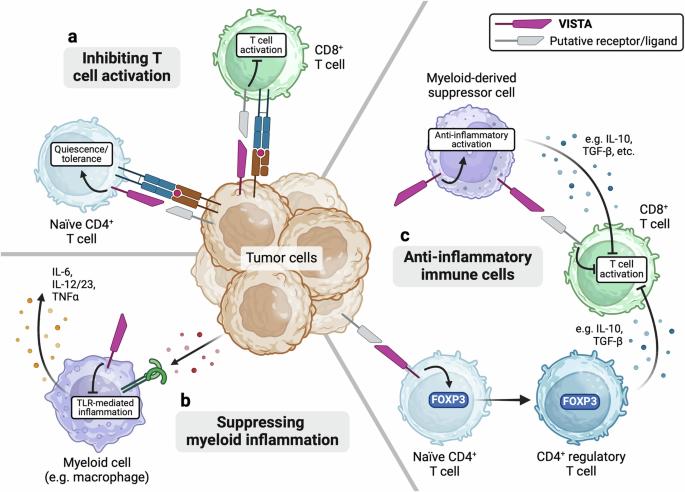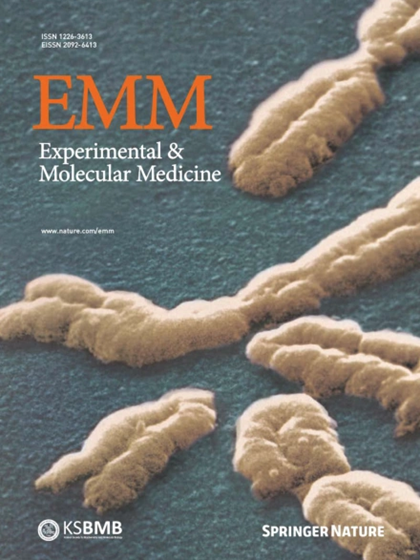VISTA 介导的癌症免疫逃避。
IF 9.5
2区 医学
Q1 BIOCHEMISTRY & MOLECULAR BIOLOGY
引用次数: 0
摘要
在过去十年中,V 域免疫球蛋白 T 细胞活化抑制因子(VISTA)已被确定为一种负性免疫检查点分子。自 VISTA 在抑制 T 细胞活化方面的作用被描述以来,研究已经证明了它在多种免疫细胞群中的其他不同调节功能。此外,还发现了它与人类癌症的相关性。VISTA 在癌症免疫逃避中的作用已经确定,但其在肿瘤微环境中的作用机制仍有待进一步阐明。了解 VISTA 对癌症的发生、发展以及对目前治疗方法的耐受性所起的作用,对于将其作为新型免疫疗法的靶点至关重要。在此,我们总结了目前对癌症中 VISTA 生物学特性的理解。本文章由计算机程序翻译,如有差异,请以英文原文为准。

VISTA-mediated immune evasion in cancer
Over the past decade, V-domain immunoglobulin suppressor of T-cell activation (VISTA) has been established as a negative immune checkpoint molecule. Since the role of VISTA in inhibiting T-cell activation was described, studies have demonstrated other diverse regulatory functions in multiple immune cell populations. Furthermore, its relevance has been identified in human cancers. The role of VISTA in cancer immune evasion has been determined, but its mechanisms in the tumor microenvironment remain to be further elucidated. Understanding its contributions to cancer initiation, progression, and resistance to current treatments will be critical to its utility as a target for novel immunotherapies. Here, we summarize the current understanding of VISTA biology in cancer. Cancer immune surveillance, the body’s method of using the immune system to find and kill cancer cells, is sometimes thwarted, leading to tumor growth. This review focuses on a protein named V-domain immunoglobulin suppressor of T-cell activation (VISTA) and examines how it may help cancer cells avoid immune detection. Studies with both human and mouse cells have identified how VISTA works and its effect on immune cells. Mouse model experiments and analyses of human cancer samples have also investigated how VISTA affects the immune system’s cancer-fighting ability. Together, these studies suggest that high VISTA levels in immune cells can hinder the immune response against tumors, aiding cancer cell growth and spread. Therefore, future strategies targeting VISTA could improve the immune system’s ability to find and kill cancer cells and require further investigation. This summary was initially drafted using artificial intelligence, then revised and fact-checked by the author.
求助全文
通过发布文献求助,成功后即可免费获取论文全文。
去求助
来源期刊

Experimental and Molecular Medicine
医学-生化与分子生物学
CiteScore
19.50
自引率
0.80%
发文量
166
审稿时长
3 months
期刊介绍:
Experimental & Molecular Medicine (EMM) stands as Korea's pioneering biochemistry journal, established in 1964 and rejuvenated in 1996 as an Open Access, fully peer-reviewed international journal. Dedicated to advancing translational research and showcasing recent breakthroughs in the biomedical realm, EMM invites submissions encompassing genetic, molecular, and cellular studies of human physiology and diseases. Emphasizing the correlation between experimental and translational research and enhanced clinical benefits, the journal actively encourages contributions employing specific molecular tools. Welcoming studies that bridge basic discoveries with clinical relevance, alongside articles demonstrating clear in vivo significance and novelty, Experimental & Molecular Medicine proudly serves as an open-access, online-only repository of cutting-edge medical research.
 求助内容:
求助内容: 应助结果提醒方式:
应助结果提醒方式:


